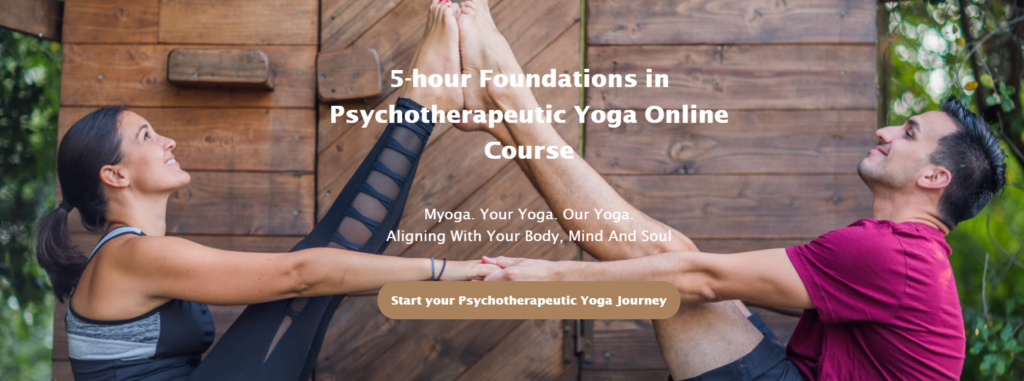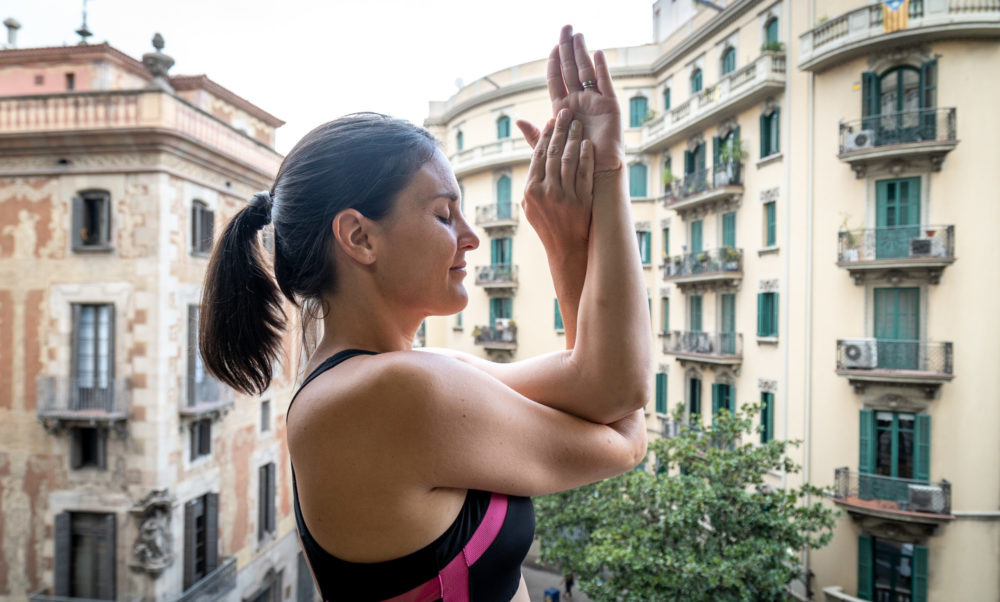Yoga for Anxiety – 3 poses to do
If you suffer from anxiety and often feel overwhelmed, you need to try these 3 following simple Yoga Poses for anxiety.
It’s normal to feel anxious from time to time, especially if your life is stressful. However, excessive, ongoing anxiety that is difficult to control and interfere with day-to-day activities is a sign to seek professional help before your anxiety becomes severe. In most cases, generalized anxiety disorder improves with psychotherapy or medications. Making lifestyle changes, learning coping skills, and using relaxation, breathing techniques, and yoga can help tremendously.
First – Breath!
Try to take deep, slow breaths that fill your belly (not just your chest). Draw air in through your nose and exhale through your mouth. You can also try a Langana breathing ratio. Breathing with awareness a Langhana ratio is designed to eliminate and reduce, any feelings of heaviness in the abdominal region, excess energy, thoughts, and strong emotions.
The emphasis in a Langhana practice is on the exhale, then progressing toward extending the exhalation and then suspending the breath for a few seconds after exhaling.
Example Langhana ratios: 4-2-6-2
Inhale for 4 seconds, hold for 2, exhale for 6 and hold for 2. Do not hesitate to change the ratio equally should you have a superior breathing capacity, we could adapt the ratio as 5-3-7-3 / 6-4-8-4, and so one.
Asanas
Postures for calming anxiety are mainly standing, supine, or seated forward bends and twists which are practiced because of their effects on and in the abdomen region. Postures are practiced dynamically than held static.
We can observe 3 categories of Asanas that are used for calming and cooling:
- Forward bends
- Twist
- Inversions
Use each of them while breathing deeply in and out (in Ujjayi breath), staying in the postures for a couple of breaths. Repeats the asana as many times as you need to.
Uttanasana
Standing forward fold is really good for getting a stretch down the back of your legs. It stretches hamstrings, calves, and hips. Uttanasana improves oxygen-rich blood flow to the brain as the head is positioned below the heart in this pose. Regular practice of Uttanasana relieves anxiety and stress and helps calm the mind. Start by standing straight; keep hands on hips and inhale. Extend hands above you and bend your torso forward as you exhale.
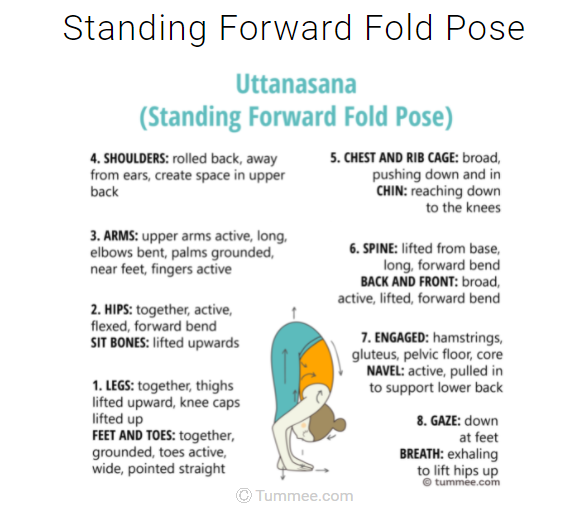
Parivrtta Trikonasana
Parivrtta Trikonasana activates our core muscles, which aids in balance and stability. It stretches and lengthens the spine. This pose can reduce stiffness in the spine and back, resulting in increased flexibility. Opens the hips and shoulders. It helps to massage the internal organs, improving the functioning of the digestive system. Twists involving balance keep the nervous system calm. It also helps to improve the calmness of the mind reducing stress and anxiety.
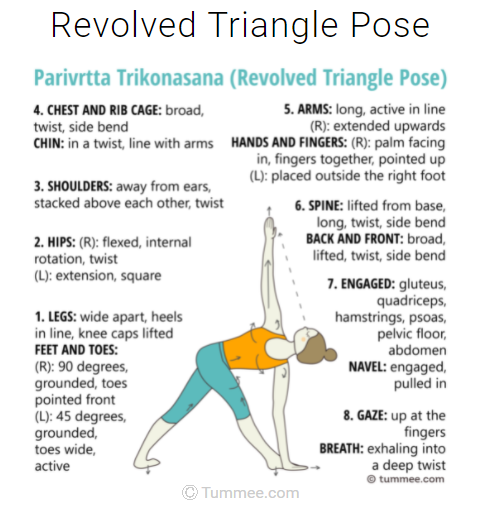
Viparita Karani
Viparita Karani is a supported restorative pose, which has an impact on the entire back. The pressure on the core is lesser due to the wall support in this supine pose. Lying down on your back, bring the hips close to the wall making sure the back is comfortable. Inhale and bring the legs up the wall slowly adjusting the hips and the upper body. Close your eyes and breathe slow and deep. Hold this pose for anywhere from 5 to 10 minutes. This pose will tone and stimulate vital organs, endocrine glands, and nervous system and promotes better functioning and integration of the entire system.
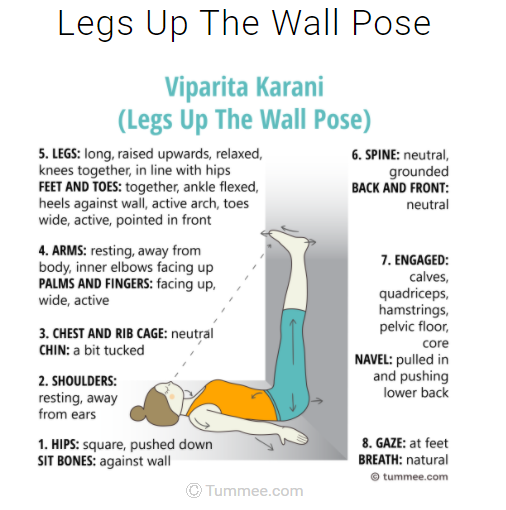
Why Yoga is good for your mental health!
Yoga’s been around for centuries. But over the last couple of decades, its popularity has hit global levels.
A 2016 review found evidence that Hatha Yoga helped reduce anxiety, especially for people who experienced more anxiety than average. Anxiety and depression often go hand in hand. Yoga can help with this too. A 2017 review found that yoga could help reduce depression symptoms. In this review, people with chronic back pain, pregnant people, and people with substance use disorder all benefited from a regular yoga routine.
We have just released our 5-hour Foundations in Psychotherapeutic Yoga Online Course. This course will help you to learn and create yoga sequences that positively affect your mental health and well-being, with key insights from neurobiology science, specific yoga poses, pranayamas, Ayurveda, and meditation.
Psychotherapeutic Yoga focuses on traditional yoga poses and neurobiology science, that will bring a calming, energizing, or balancing effect in your body and mind. It is a brain-body approach, working on the regulation of your nervous systems, significantly reducing anxiety, insomnia, stress, emotional and mental fatigue. The practice will create an environment for growth and well-being.
Get more information here through this link or click below! https://myogastudio.teachable.com/p/psychotherapeutic-yoga-online-course


